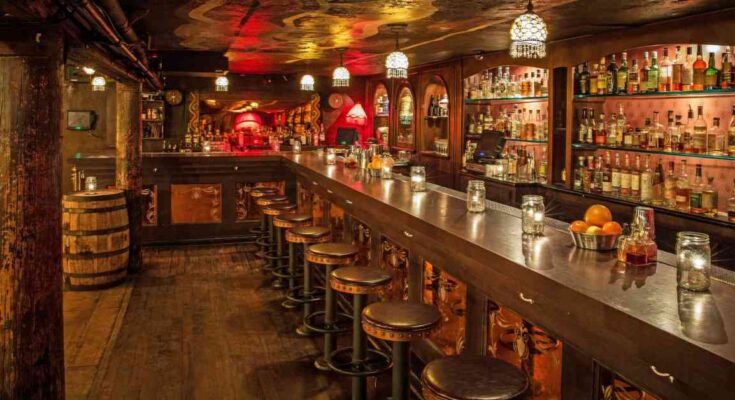What is a Speakeasy
In the annals of American history, the term “speakeasy” evokes images of clandestine bars tucked away behind unmarked doors, where patrons indulged in illegal drinks during the Prohibition era. However, the allure of these secretive establishments extends far beyond their historical context, captivating modern audiences with their mysterious charm and vintage appeal.
Origin and History of Speakeasy
Speakeasies emerged in the 1920s as a response to the nationwide ban on alcohol imposed by the Prohibition amendment. Fueled by the temperance movement, the law prohibited the sale, production, and transportation of alcoholic beverages, driving the liquor trade underground. Speakeasies became havens for those seeking to circumvent Prohibition laws, offering illicit drinks to patrons willing to risk legal consequences.
The clandestine nature of speakeasies was paramount to their survival. Operating discreetly behind closed doors, these establishments often required a password for entry, ensuring that only trusted individuals gained access. Despite the constant threat of police raids and enforcement efforts, speakeasies flourished, becoming integral to the fabric of American nightlife during the Prohibition era.
Characteristics of Speakeasies
Speakeasies were characterized by their clandestine operations and secretive ambiance. Often located in hidden or inconspicuous locations, such as basements or back alleys, these establishments remained elusive to authorities and the general public. Entry to a speakeasy typically required knowledge of a secret password or a discreet signal, adding to the sense of exclusivity and mystery.
The interior decor of speakeasies reflected their underground nature, featuring dim lighting, cozy seating arrangements, and vintage decor reminiscent of the Roaring Twenties. Despite the illegality of their operations, speakeasies attracted a diverse clientele, including politicians, celebrities, and ordinary citizens seeking refuge from Prohibition laws.
Role in American Culture
Speakeasies played a pivotal role in shaping American culture during the Prohibition era. Beyond serving as venues for illicit drinking, these establishments became hubs of creativity and socialization, fostering the emergence of jazz music, dance, and literary movements. Iconic figures such as F. Scott Fitzgerald and Duke Ellington frequented speakeasies, contributing to their legendary status in American folklore.
Modern Speakeasies
While Prohibition may have ended nearly a century ago, the allure of speakeasies persists in contemporary society. In recent years, a resurgence of speakeasy-style bars has emerged, capturing the imagination of a new generation of patrons eager to experience the clandestine charm of the Roaring Twenties.
Modern speakeasies often pay homage to their historical predecessors while adding unique twists to the concept. From hidden entrances disguised as phone booths to password-protected cocktail menus, these establishments offer immersive experiences that transport patrons back in time to an era of jazz, flappers, and bootleggers.
Legal Challenges and Regulations
Despite their popularity, modern speakeasies face legal challenges and regulatory hurdles. Operating a bar without the necessary permits and licenses can result in hefty fines and legal consequences, prompting owners to navigate complex liquor laws and regulations to ensure compliance.
While the allure of speakeasies lies in their secretive nature, maintaining operational transparency is essential for legal compliance and public safety. Many modern speakeasies work closely with regulatory authorities to obtain the required permits and licenses while preserving the clandestine ambiance that defines the speakeasy experience.
Experience and Ambiance
What sets speakeasies apart from traditional bars is the immersive experience they offer patrons. From meticulously crafted cocktails to intimate settings conducive to conversation and camaraderie, speakeasies prioritize quality over quantity, providing a respite from the hustle and bustle of modern life.
Craft cocktails are a hallmark of the speakeasy experience, with expert bartenders concocting artisanal drinks using premium spirits and fresh ingredients. The attention to detail and craftsmanship that goes into each cocktail elevates the drinking experience, making it a memorable affair for patrons.
Appeal to Millennials
In an age of digital distractions and fleeting trends, speakeasies offer millennials a welcome escape into the past. The nostalgic allure of the Roaring Twenties, coupled with the authenticity of speakeasy culture, resonates with a generation yearning for experiences that transcend the virtual realm.
Beyond nostalgia, speakeasies appeal to millennials seeking Instagrammable moments and unique social experiences. The clandestine nature of these establishments, combined with their vintage decor and craft cocktails, provides ample photo opportunities for patrons eager to document their night out on social media.
Global Spread
While speakeasies may have originated in the United States, their influence has spread far and wide, shaping bar culture worldwide. From Tokyo to London, cities around the globe boast their own interpretations of the speakeasy concept, adapting it to local tastes and traditions.
The global spread of speakeasies underscores their enduring appeal and universal charm. Whether nestled in the alleys of Paris or hidden beneath the streets of Hong Kong, these clandestine bars continue to captivate patrons with their mysterious allure and vintage ambiance.
Contemporary Significance
In an era marked by innovation and rapid change, speakeasies serve as bastions of tradition and authenticity. Their resurgence in popularity reflects a broader cultural shift towards artisanal craftsmanship and experiential consumption, challenging conventional notions of nightlife and entertainment.
The contemporary significance of speakeasies lies in their ability to evoke nostalgia while remaining relevant in a rapidly evolving world. By blending old-world charm with modern sensibilities, these establishments offer patrons a taste of the past without sacrificing the comforts of the present.
Criticism and Controversy
Despite their enduring popularity, speakeasies have not been immune to criticism and controversy. Some critics argue that the romanticized portrayal of speakeasy culture glosses over its darker aspects, including its association with organized crime and social inequality.
Additionally, concerns have been raised about the elitism and exclusivity inherent in the speakeasy experience. The secretive nature of these establishments, coupled with their high prices and selective entry policies, can contribute to a sense of exclusion among those unable to afford or access them.
Future of Speakeasies
As the cultural landscape continues to evolve, the future of speakeasies remains uncertain. While some may view them as relics of a bygone era, others see them as enduring symbols of resilience and adaptability, capable of evolving with the times while preserving their timeless charm.
The future of speakeasies lies in their ability to innovate and diversify, embracing new trends and technologies while staying true to their roots. Whether through sustainable practices, community engagement, or experiential storytelling, speakeasies have the potential to remain relevant for generations to come.
Influence on Cocktail Culture
Speakeasies have had a profound influence on cocktail culture, shaping trends and techniques that continue to resonate with bartenders and mixologists worldwide. From classic recipes revived during the Prohibition era to contemporary innovations inspired by speakeasy culture, cocktails served in these clandestine bars are as diverse as they are delicious.
The resurgence of speakeasies has reignited interest in mixology, prompting bartenders to experiment with new flavors, ingredients, and presentation styles. From molecular gastronomy to farm-to-table sourcing, speakeasies push the boundaries of creativity and craftsmanship, setting the standard for cocktail culture in the 21st century.
Community Engagement
Beyond serving as venues for drinking and socializing, speakeasies play an active role in their communities, hosting charity events, cultural gatherings, and educational programs. By fostering connections and fostering dialogue, these establishments contribute to the social fabric of their neighborhoods, enriching the lives of patrons and residents alike.
From fundraising initiatives to historical preservation efforts, speakeasies demonstrate a commitment to giving back to the communities that support them. Whether through donations to local charities or partnerships with cultural institutions, these establishments strive to make a positive impact beyond their walls.
Conclusion: Resilience and Legacy
In conclusion, speakeasies occupy a unique place in the cultural landscape, blending history, tradition, and innovation to create memorable experiences for patrons around the world. From their humble origins during Prohibition to their resurgence in the 21st century, speakeasies have endured as symbols of resilience and defiance, challenging conventions and captivating imaginations.
As we raise a glass to toast the legacy of speakeasies, let us not forget the lessons they teach us about adaptation, creativity, and community. Whether hidden behind unmarked doors or celebrated in the pages of history books, speakeasies remind us of the enduring power of human ingenuity and the timeless allure of a well-crafted cocktail.
Unique FAQs
- Are speakeasies legal today?
- Most modern speakeasies operate legally by obtaining the necessary permits and licenses, although they may still maintain a secretive ambiance reminiscent of Prohibition-era bars.
- How can I find a speakeasy near me?
- Speakeasies often rely on word-of-mouth recommendations or online reviews to attract patrons. You can also look for hidden entrances or unmarked doors in your city’s nightlife district.
- What should I expect at a speakeasy?
- Expect an intimate setting, expertly crafted cocktails, and a secretive ambiance reminiscent of the Prohibition era. Some speakeasies may require a password or reservation for entry.
- Are speakeasies only found in the United States?
- While speakeasies originated in the United States during Prohibition, similar clandestine bars can now be found in cities around the world, each with its own unique twist on the concept.
- What makes speakeasies different from traditional bars?
- Speakeasies prioritize quality over quantity, offering meticulously crafted cocktails, hidden entrances, and a secretive ambiance that harkens back to the Roaring Twenties.




